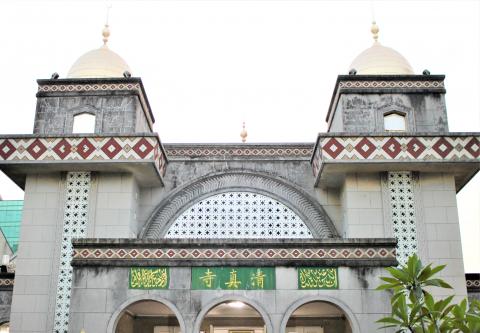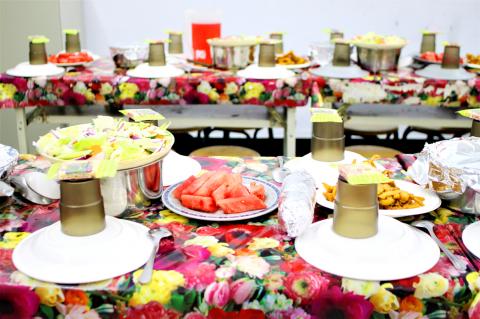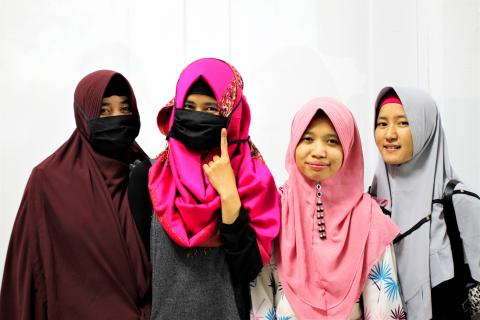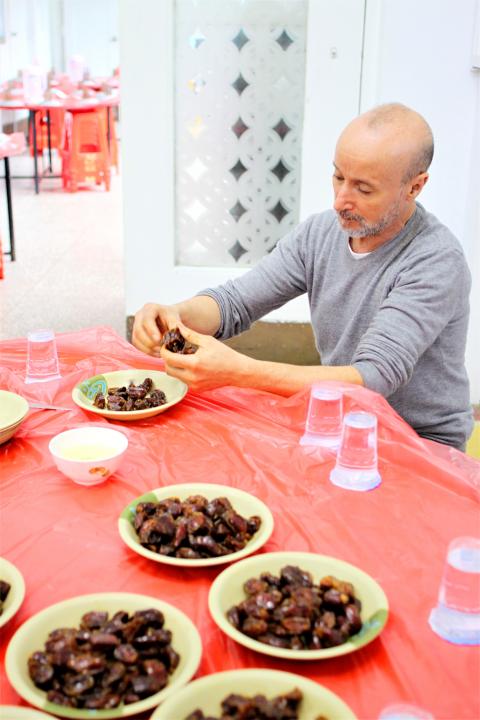When Zaharah Chen (陳俞如) converted to Islam in the summer of 2013, it was a momentous decision that she intended to honor in all aspects of her life. But when she wore a headscarf to work the next day, the sight shocked her employer, who at first thought that Chen was dressing up for cosplay.
After being informed of its religious significance, “he said, ‘You’ve become a Muslim? Do you know that Islam is a terrorist religion? Why would you join a religion like that?’” Chen recounts.
Chen was dismissed later that day on the grounds that her work was unsatisfactory. She decided not to dispute the firing so as not to put her long-time employer in a difficult position. But the experience was dispiriting.

Photo: Davina Tham, Taipei Times
“I felt very sad. Why would you negate a person because of her religious beliefs, especially when what you think about her religion is not correct at all?” she tells the Taipei Times.
In a society where ignorance and insensitivity toward Islam are still common, Taipei’s Grand Mosque has become a sanctuary where Chen and other Muslims find community and understanding, especially during the holy month of Ramadan.
THE GRAND MOSQUE

Photo: Davina Tham, Taipei Times
Chen is a lifelong native of Taipei. But on the day of her conversion at the Grand Mosque, she, like many locals, found herself in a part of the city she had never set foot in before.
The Grand Mosque, with its full green dome and two minarets, has been part of the cityscape since 1960. It is the largest of eight mosques in Taiwan. Chairperson Feng Tung-yu (馮同瑜) estimates that 2,000 people pass through the mosque’s doors each week.
Attendance peaks during Ramadan, which falls between May 6 and June 4 this year. From sunrise to sunset, Muslims who are physically able are required to abstain from all food and drink.

Photo: Davina Tham, Taipei Times
Following Islamic custom, the Grand Mosque provides complimentary iftar — a communal evening meal to break fast — throughout Ramadan. Donations from the congregation, ranging from NT$30,000 to NT$50,000, cover the cost of each meal. On the day that I visit, a group of Pakistani volunteers are preparing curries, salad, rice and flatbread.
During the holy month, Juniata, an Indonesian domestic helper working in Hsinchu County, makes a special weekend trip to the Grand Mosque for prayers and iftar.
When I meet her, Juniata is huddled together with other young Indonesian women, all of whom she has just met earlier that day during prayers. The women chitchat among themselves in their mother tongue, but switch to a colloquial Chinese outside of their group.

Photo: Davina Tham, Taipei
The iftar mainly draws people from low to middle-income brackets, migrant workers and exchange students. All of this makes for a strikingly international congregation, where strangers of myriad ethnicities sit shoulder-to-shoulder at the dining table.
But not everyone is there for God alone, nor even for the free meal. The prospect of being in a space where Muslims are the majority, moving freely among fellow worshipers, can be a salve to the daily stress of living as a minority.
BRIDGING THE GAP
Juniata and Shofia, another domestic worker, consider themselves fortunate because their employers respect their right to practice their religion.
Both women fast during Ramadan, wear headscarves at work and sometimes cook and store their own halal meals in their employers’ kitchens.
When I ask if fasting makes it hard to carry out physically-demanding tasks, Juniata replies that it’s no more difficult than usual.
“Our bosses are very good,” she says. “But there are some bad ones, too.”
Shofia recalls an uncomfortable experience with her employers’ friends, who questioned why she wore a headscarf, long-sleeved shirt and long pants even in the heat of summer.
“They might think it is strange to cover up their own hair,” Shofia says, frowning. But on the contrary, “if I don’t cover up my hair, then I feel strange.”
Chen, who has studied Islam in Malaysia and the United Arab Emirates, says that even she at first avoided Islam when embarking on the religious exploration that eventually led to her conversion.
Among most Taiwanese “there is no clear understanding of Islam, only certain messages conveyed by the media,” Chen says. Initially, she too was put off by stereotypes that associate Islam with terrorism and the Sept. 11, 2001 attacks in the US.
Partly to combat ignorance about Islam, and partly because of the secular environment in which it operates, the Grand Mosque makes an effort to keep its doors open to non-believers. Women whose heads are uncovered are not turned away. Worshipers offer food and greetings to visitors, regardless of their religion.
“We are more easygoing with non-Muslims, because we also hope that they can understand Islam,” Feng says. “If you have too many restrictions and you tie their hands, they won’t come. Then with time as they grow distant, they will become estranged.”
Despite Chen’s bitter experience with her former employer, she too believes that understanding is possible with time and patience.
Chen’s parents also questioned their daughter’s decision to convert, asking why she was joining a religion that they felt was oppressive toward women. She made an effort to explain what Islam meant to her and clarify their misconceptions.
Six years on, Chen says that her parents have now grasped and even agree with the basic precepts of Islam, like why Muslim women cover themselves up. Both generations have reached an understanding, even as Chen’s parents continue to practice folk traditions, like ancestral worship.
And when faced with questions from the ignorant or skeptical, she has gained an unexpected ally.
Now an employee of the Chinese Muslim Association (中國回教協會), Chen once found herself engaging visitors at the annual Taipei Eid al-Fitr and Muslim Festival. Curious passersby asked her about the Muslim attire, dietary restrictions and other practices they find exotic.
Chen’s mother happened to be there that day, and spoke up.
“Sometimes even she will help me to explain why I don’t eat pork and why I am dressed like this,” Chen says.

Words of the Year are not just interesting, they are telling. They are language and attitude barometers that measure what a country sees as important. The trending vocabulary around AI last year reveals a stark divergence in what each society notices and responds to the technological shift. For the Anglosphere it’s fatigue. For China it’s ambition. For Taiwan, it’s pragmatic vigilance. In Taiwan’s annual “representative character” vote, “recall” (罷) took the top spot with over 15,000 votes, followed closely by “scam” (詐). While “recall” speaks to the island’s partisan deadlock — a year defined by legislative recall campaigns and a public exhausted

Hsu Pu-liao (許不了) never lived to see the premiere of his most successful film, The Clown and the Swan (小丑與天鵝, 1985). The movie, which starred Hsu, the “Taiwanese Charlie Chaplin,” outgrossed Jackie Chan’s Heart of Dragon (龍的心), earning NT$9.2 million at the local box office. Forty years after its premiere, the film has become the Taiwan Film and Audiovisual Institute’s (TFAI) 100th restoration. “It is the only one of Hsu’s films whose original negative survived,” says director Kevin Chu (朱延平), one of Taiwan’s most commercially successful

In the 2010s, the Communist Party of China (CCP) began cracking down on Christian churches. Media reports said at the time that various versions of Protestant Christianity were likely the fastest growing religions in the People’s Republic of China (PRC). The crackdown was part of a campaign that in turn was part of a larger movement to bring religion under party control. For the Protestant churches, “the government’s aim has been to force all churches into the state-controlled organization,” according to a 2023 article in Christianity Today. That piece was centered on Wang Yi (王怡), the fiery, charismatic pastor of the

The primaries for this year’s nine-in-one local elections in November began early in this election cycle, starting last autumn. The local press has been full of tales of intrigue, betrayal, infighting and drama going back to the summer of 2024. This is not widely covered in the English-language press, and the nine-in-one elections are not well understood. The nine-in-one elections refer to the nine levels of local governments that go to the ballot, from the neighborhood and village borough chief level on up to the city mayor and county commissioner level. The main focus is on the 22 special municipality